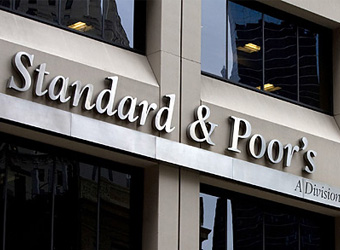Standard & Poor’s Ratings Services has raised on Monday its long-term counterparty credit ratings on National Bank of Egypt (NBE), Banque Misr (BM), and Commercial International Bank (Egypt) S.A.E. (CIB) (COMI.CA) to ‘B-‘ from ‘CCC+’. At the same time, it affirmed the short-term counterparty credit ratings on NBE, BM, and CIB at ‘C’. The outlooks on the three banks are stable. At the same time, it raised the unsolicited public information (‘pi’) rating on National Societe Generale Bank S.A.E. (NSGB) to ‘B-pi’ from ‘CCCpi’.
The rating actions follow the upgrade of the Arab Republic of Egypt. S&P said that in its view, the Egyptian authorities have secured sufficient foreign currency funding to manage the country’s short-term fiscal and external financing needs. S&P expects support from bilateral lenders to continue over the medium term as the Egyptian authorities try to address the country’s political and economic challenges.
The ratings agency said, “In our view, NBE, BM, CIB, and NSGB face very high sovereign risk because they hold a very high amount of government debt compared with their equity base and earnings capacity.
“We currently assess the stand-alone credit profile (SACP) of BM at ‘b-‘, of NBE at ‘b-‘, and of CIB at ‘b’. We also assess NSGB’s SACP in the ‘b’ category. CIB and NSGB display stronger capital metrics than NBE and BM, and this is a positive rating factor, in our view.
“Our ratings on CIB and NSGB do not exceed the sovereign ratings because of their sizable on-balance-sheet exposure to the sovereign.
“We consider NBE and BM to be government-related entities under our methodology, given their full ownership by the Egyptian government. However, we factor in no uplift for potential timely and sufficient extraordinary government support because we assess NBE’s and BM’s SACP at the same level as the long-term rating on the sovereign.
OUTLOOK
“The stable outlooks on NBE, BM, and CIB mirror the stable outlook on Egypt. They balance our view of Egypt’s difficult political landscape and significant external financing pressures against relatively generous support from bilateral donors.
“We could lower the ratings on the sovereign if we concluded that the Egyptian authorities were unable to prevent a further significant deterioration in external, fiscal, or monetary indicators. We could also lower the ratings if we believed donor support was unlikely to be forthcoming in a sufficient and timely manner to help Egypt meet its financial obligations. Accordingly, we would then also lower the ratings on NBE, BM, CIB, and NSGB.
“We could raise the ratings on Egypt if its political transition strengthens relations between the government and wider society and brings about a sustained improvement in external performance, including net international reserves, thereby easing external pressures. Accordingly, we would likely raise our ratings on NBE, BM, NSGB, and CIB if we were to raise our ratings on the sovereign; for CIB and NSGB because the ratings on these banks are constrained at the sovereign level; for NBE and BM because their credit exposure to the sovereign represents their biggest credit risk exposure, in our view.”


